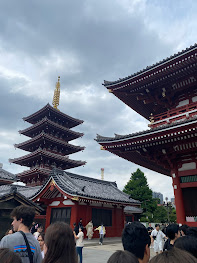Upon arrival, Japan has a quiet, serene aura. I had always pictured Tokyo specifically as a loud bustling city, perhaps as the New York City of eastern Asia. Instead, everything is designed with intent, and the Japanese people have an utmost sense of respect for their city and each other. Calming silence filled Narita International Airport, as it did the trains and the nighttime streets of Akabane. Everyone upholds unwritten standards for volume and body language in public spaces, whether sacred or secular. The practical silence of Tokyo foils the wild cacophony of our home city, and I believe it can be attributed to ideas of religion and tradition throughout Japan.
Shintoism is a highly pragmatic religion, with priests and academics widely accepting the notion that following it leads to this-worldly benefits. Many different Shinto gods are called upon through prayer and the use of amulets. Gods can help improve earthly life in many ways, such as passing an exam, finding a worthy marriage, bringing forth children, and granting long life, good luck, and good fortune. Every prayer is sincere, and every action is deliberate. One can reap the benefits of Shintoism whether they practice the religion or not, as there are no absolutes – which, again, is all intentional. It appears that everything from the physical design of shrines to the way in which you choose to visit them is done with the worshiper, the gods, and the secular visitor in mind. This has been highly evident at Shinto shrines we’ve seen. At Meiji-Jingu, you are meant to walk alongside the main path, as only evil can travel straight ahead with no chance. At Yasukuni, a deliberate sense of loss is depicted through sympathy-catching statues and memorials to mourning families and lost war animals. At Tōshogu, we heard part of a sutra ceremony, wherein sounds said out loud bring forth power, not words themselves. At many shrines, votive tablets are left hanging for anyone and everyone to see, not just the gods. This reflexive sense of respect and intent extends to mundane, day to day activities, not just religious efforts. All actions, whether big or small, leave a lasting impact on one’s life. Ultimately, it is this unspoken sense of respect that contributes to the serenity I saw among Tokyo locals.
So far, everything I have been immersed in has been centered around respect for oneself and for the world around you, and this goes far beyond the bounds of religion. I take these observations and rest assured in knowing I have the deliberate power to change paths, and evil does not. And from now on, I will slurp my noodles instead of biting them, so as to keep living a long, fulfilling life.
Source link
All Materials on this website/blog are only for Learning & Educational purposes. It is strictly recommended to buy the products from the original owner/publisher of these products. Our intention is not to infringe any copyright policy. If you are the copyright holder of any of the content uploaded on this site and don’t want it to be here. Instead of taking any other action, please contact us. Your complaint would be honored, and the highlighted content will be removed instantly.




